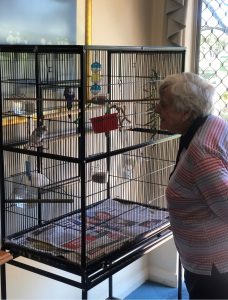What has black and copper fur, white paws and gives lots of love to the residents at Mercy Place Montrose? Daisy the King Charles spaniel — just one of the many pets that visit or live in Mercy Health’s aged care homes and give the residents regular doses of comfort and joy.
Mercy Place Montrose Lifestyle Coordinator Deidre Halligan is Daisy’s proud owner and brings her along to the home for a full day’s work three days a week. Daisy gets very upset on the two days of the week when Deidre goes to work without her. “She knows her days, alright,” says Deidre.

Daisy the Mercy Place Montrose therapy dog gets into the festive spirit.
Daisy has been in her visiting routine for six years now and is an important member of the family at Mercy Place Montrose. “The residents love her,” says Deidre. ”All the residents know her by name and they all call her and she will go up to them and give them lots of love. She becomes the topic of conversation whenever she enters the room.”
She has a particularly calming effect on residents living with Alzheimer’s disease and other forms of dementia. “They’ll hold her and just look into her eyes. Often they will go back in time when they look at her — you can see it in their eyes. They will start talking about their childhood pets, so it creates conversation. Daisy always triggers a memory when she is around them — always,” says Deidre.

Daisy is a great comfort to the residents at Mercy Place Montrose.
Pet therapy began in the 1990s and animals are now commonly used in residential aged care homes to introduce more energy and life to the environment and provide residents with a source of gentle and undemanding interaction.
A randomised trial conducted across 10 aged care homes, which looked at the effect of animal-assisted therapy on men and women over 65 years of age who had Alzheimer’s disease or other forms of dementia, found that it significantly alleviated depression and improved their quality of life.¹
Daisy certainly has a positive effect on the residents of Mercy Place Montrose.
“Because she is just so quiet and laid back, Daisy is a very calming presence. She is very social and gives residents lots of joy and comfort,” says Deidre.
It’s lovely to see the residents happy and engaged
Daisy also gives residents added motivation to exercise and enjoy the outdoors. Mercy Place Montrose resident Sylvia takes Daisy out for walks each week with a group of other residents. “The days we see her are pretty special. She gives me lots of happiness and is always so friendly,” says Sylvia.

Mercy Place Montrose resident Sylvia loves getting out and about with Daisy.
Animals are also a significant part of the daily life at Mercy Place Mandurah in Western Australia. “We have lots of interactions with animals at our home and the residents love them,” says Mercy Place Mandurah Lifestyle Coordinator Nichole Cuthbert.
The home is located next to a park and when the weather is nice, the residents will go for walks and interact with the dogs that are there. They also occasionally have visits from animal farms and have three large aviaries located in different areas of the home, which house colourful budgerigars.

Mercy Place Mandura resident Violet loves to watch the budgies.
“Late in the afternoon when I’m leaving, I will often see residents sitting together near one of the bird cages and talking about them. Other times I see the residents walk up to the cage and chat to the birds, or walk past, have a look in and make sure they’re okay,” says Nichole.
“The birds seem to bring back a lot of memories for residents and it’s lovely to see them happy and engaged.”
1. Olsen C, Pedersen I, Bergland A, Enders-Slegers MJ, Patil G, Ihlebaek C. Effect of animal-assisted interventions on depression, agitation and quality of life in nursing home residents suffering from cognitive impairment or dementia: a cluster randomised controlled trial. Int J Geriatr Psychiatry. 2016 Dec.
Last reviewed December 19, 2021.



